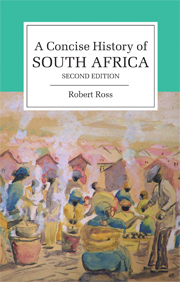Book contents
- Frontmatter
- Dedication
- Contents
- List of illustrations
- Preface
- Terminology and orthography
- Introduction
- 1 The settlement of the country
- 2 Colonial conquest
- 3 Unification
- 4 Consolidation
- 5 Apartheid
- 6 The costs of apartheid
- 7 ‘Let freedom reign’: the ending of apartheid and the transition to democracy, 1980–1994
- 8 Epilogue: the acid rain of freedom
- Suggestions for further reading
- Index
4 - Consolidation
Published online by Cambridge University Press: 18 December 2014
- Frontmatter
- Dedication
- Contents
- List of illustrations
- Preface
- Terminology and orthography
- Introduction
- 1 The settlement of the country
- 2 Colonial conquest
- 3 Unification
- 4 Consolidation
- 5 Apartheid
- 6 The costs of apartheid
- 7 ‘Let freedom reign’: the ending of apartheid and the transition to democracy, 1980–1994
- 8 Epilogue: the acid rain of freedom
- Suggestions for further reading
- Index
Summary
The political union of the four colonies did not require, or entail, uniformity even among the whites. Rather, it provided the opportunity for latent conflicts to become manifest. The main arguments centred on the content of South African nationality. There were still those who had not accepted the outcome of the South African War: the incorporation of the whole region into the British Empire. This had specific consequences with the outbreak of World War I. Numerous Afrikaners were appalled by Prime Minister Louis Botha's precipitate decision to enter the war. One general defected with some of his troops to German South West Africa, and a small group of Afrikaners in the western Transvaal rose in a rebellion, which was swiftly put down, though not before it had added to the mythology on which Afrikaner nationalism would feed. Thereafter, the Prime Minister, reverting to his old profession of general, led the South African conquest of South West Africa, which from 1915 was to be administered by the Union, initially more or less as a colonial territory.
The 1914 revolt was not really serious politics and had no chance of short-term success. More threatening were the actions of J.B.M. Hertzog, an ex-judge and general of the Orange Free State. He was a member of the first Union Cabinet, under the auspices of the South African Party, until he resigned in 1914 to form the National Party. The nation which this new party – and Hertzog after 1910 – claimed to be propagating was the white South African nation. This could, however, be created only if there was parity between the Dutch and English in terms of their access to power and resources. As this was certainly not the case, the consequence of his position was a major push to improve the status of the Dutch language within government business.
- Type
- Chapter
- Information
- A Concise History of South Africa , pp. 91 - 121Publisher: Cambridge University PressPrint publication year: 2008



